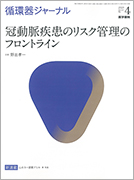1) Koenig W, Khuseyinova N:Biomarkers of atherosclerotic plaque instability and rupture. Arterioscler Thromb Vasc Biol 27:15-26, 2007
2) Inoue T, Node K:Vascular failure:a new clinical entity for vascular disease. J Hypertens 24:2121-2130, 2006
3) Kinlay S, Selwyn AP, Libby P, et al:Inflammation, the endothelium, and the acute coronary syndrome. J Cardiovasc Pharmacol 32:S62-S66, 1998
4) Szmitko PE, Wang C, Weisel RD, et al:New markers of inflammation and endothelial cell activation:part I. Circulation 108:1917-1923, 2003
5) Morrow DA, de Lemos JA, Sabatine MS, et al:Clinical relevance of C-reactive protein during follow-up of patients with acute myocardial infarction. Circulation 114:281-288, 2006
6) Braunwald E, Antman EM, Beasley JW, et al:ACC/AHA guidelines for the management of patients with unstable angina and non-ST-segment elevation myocardial infarction. A report of the American College of Cardiology/American Heart Association Task Force on Practice Guidelines(Committee on the Management of Patients With Unstable Angina). J Am Coll Cardiol 36:970-1062, 2000
7) Inoue T, Kato T, Uchida T, et al:Local release of C-reactive protein from the vulnerable plaque or coronary arterial wall injured by stenting. J Am Coll Cardiol 46:239-245, 2005
8) Gaspardone, Tomai F, Versaci F, et al:Coronary artery stent placement in patients with variant angina refractory to medical treatment. Am J Cardiol 84:96-98, 1999
9) Kinlay S, Schwartz GG, Olsson AG, et al:High-dose atorvastatin enhances the decline in inflammatory markers in patients with acute coronary syndromes in the MIRACL study. Circulation 108:1560-1566, 2003
10) Ridker PM, Danielson E, Fonseca FA, et al:Rosuvastatin to prevent vascular events in men and women with elevated C-reactive protein. N Engl J Med 359:2195-2207, 2008
11) Taguchi I, Iimuro S, Iwata H, et al:High-dose versus low-dose pitavastatin in Japanese patients with stable coronary artery disease(REAL-CAD):a randomized superiority trial. Circulation 137:1997-2009, 2018
12) Ridker PM, Everett BM, Thuren T, et al:Antiinflammatory therapy with canakinumab for atherosclerotic disease. N Engl J Med 377:1119-1131, 2017
13) Ridker PM, MacFadyen JG, Everett BM, et al:Relationship of C-reactive protein reduction to cardiovascular event reduction following treatment with canakinumab:a secondary analysis from the CANTOS randomised controlled trial. Lancet 391:319-328, 2018
14) Ridker PM, MacFadyen JG, Thuren T, et al:Effect of interleukin-1β inhibition with canakinumab on incident lung cancer in patients with atherosclerosis:exploratory results from a randomised, double-blind, placebo-controlled trial. Lancet 390:1833-1842, 2017
15) Kenny WJL, John SH, Keith R, et al:Relative value of multiple plasma biomarkers as risk factors for coronary artery disease and death in an angiography cohort. CMAJ 174:461-466, 2006
16) Keller T, Zeller T, Peetz D, et al:Sensitive troponin I assay in early diagnosis of acute myocardial infarction. N Engl J Med 361:868-877, 2009
17) Antman EM, Sacks DB, Rifai N, et al:Time to positivity of a rapid bedside assay for cardiac-specific troponin T predicts prognosis in acute coronary syndromes:a Thrombolysis in Myocardial Infarction(TIMI)11A substudy. J Am Coll Cardiol 31:326-330, 1998
18) Perna ER, Macin SM, Canella JP, et al:Ongoing myocardial injury in stable severe heart failure. Value of cardiac troponin T monitoring for high-risk patient identification. Circulation 110:2376-2382, 2004
19) Horwich TB, Patel J, MacLellan WR, et al:Cardiac troponin I is associated with impaired hemodynamics, progressive left ventricular dysfunction, and increased mortality tastes in advanced heart failure. Circulation 108:833-838, 2003
20) Thygesen K, Alpert JS, Jaffe AS, et al:Third universal definition of myocardial infarction. Circulation 126:2020-2035, 2012
21) Ishihara M, Nakao K, Ozaki Y, et al:Long-term outcomes of non-ST-elevation myocardial infarction without creatine kinase elevation:the J-MINUET study. Circ J 81:958-965, 2017

